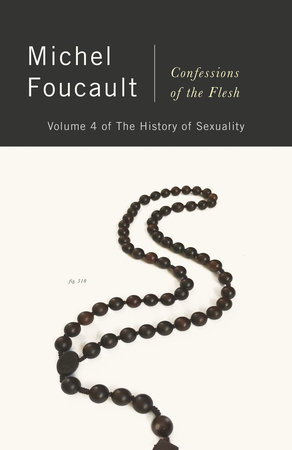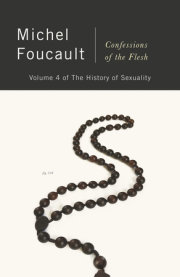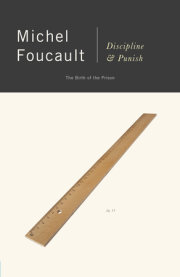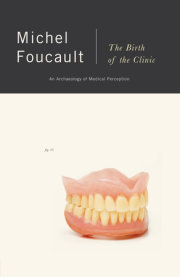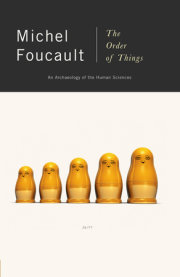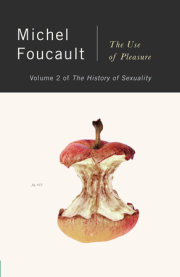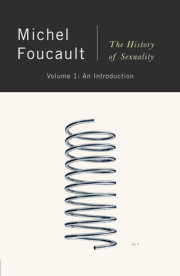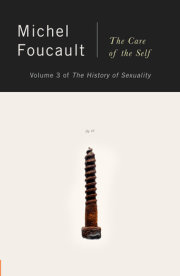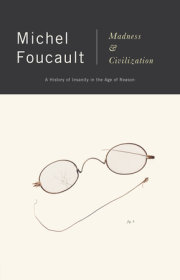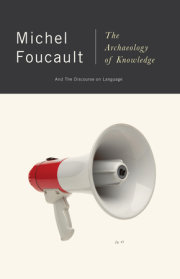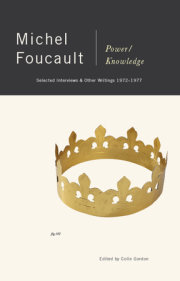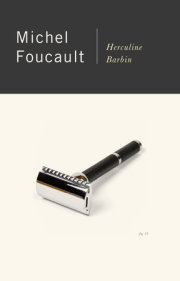1 Creation, Procreation The
aphrodisia regime
, defined in terms of marriage, procreation, a disqualification of pleasure, and a respectful and intense bond of sympathy between spouses, was formulated, it seems, by non-Christian philosophers and teachers, and their “pagan” society thought of it as an acceptable code of conduct for everyone—which doesn’t mean it was actually followed by everyone; far from it.
One finds this same regime, essentially unmodified, in the doctrine of the second-century Fathers. Those theologians, in the view of most historians, would not have found their basic principles in the early Christian communities nor in the apostolic texts—with the exception of the markedly Hellenizing letters of Saint Paul. These principles would have migrated, as it were, into Christian thought and practice, from pagan milieus whose hostility Christians needed to disarm by displaying forms of conduct that pagans already recognized and valued highly. It is a fact that apologists like Justin or Athenagoras assure the emperors they are addressing that in regard to marriage, procreation, and the
aphrodisia, Christians base their practice on the same principles as the philosophers. And to emphasize this sameness, they employ, with scant alterations, those aphoristic precepts whose words and formulations readily indicate their origin. “For our part,” says Justin, “if we marry, it is only that we may bring up children; or if we decline marriage, we live in perfect continence.”
Speaking to Marcus Aurelius, Athenagoras uses references of a Stoic sort: control of desire*—“for us procreation is the measure of desire”; rejection of any second marriage—“ whoever repudiates his wife to marry another is an adulterer,” “every remarriage is an honorable adultery”; negativity toward pleasure—“we despise the things of this life, even to the pleasures of the soul.” Athenagoras doesn’t make use of these themes to indicate traits of Christianity that are distinct from paganism. It’s a matter of showing instead how Christians don’t deserve the reproaches of immorality that have been aimed at them, and how their life is the very realization of a moral ideal that the wisdom of the pagans has long recognized. Above all, he underscores the fact that the Christians’ belief in eternal life and their desire to unite with God constitute a strong and profound reason for them to truly follow these precepts in their actions—and better still, to keep their intentions pure and to banish the very thought of the actions they condemn.
The work of Clement of Alexandria, at the end of the second century, offers a much ampler testimony concerning the
aphrodisia regime as it seems to have been incorporated into Christian thought. Clement evokes the problems of marriage, sexual relations, procreation, and continence in several texts, primarily in the
Paedagogus, chapter 10 of book 2, and also (though in a more cursory way) chapters 6 and 7 of the same book and [chapter 8] of book 3; and in the second
Stromata book, chapter 32 and the whole third book. I will analyze the first of these texts here, clarifying it when necessary by the others. There is a reason for this: the large text of the third book of the
Stromata is devoted essentially to a polemic against different gnostic themes. It is developed on two fronts: first, Clement wanted to refute those for whom the disqualification of the material world, its identification with evil, and the certainty of salvation for the chosen ones made obedience to the laws of this world irrelevant, when they did not make such transgressions obligatory and customary; second, he also sought to distance himself from the numerous Encratist tendencies that, aligning themselves more or less closely with Valentinus or Basilides, wished to deny marriage and sexual relations to all the faithful, or at least to those who intended to lead a truly saintly life. These texts are obviously crucial for understanding, through the question of marriage and self-restraint, the theology of Clement, his conception of matter, of evil and sin. The
Paedagogus, though, has a very different purpose: it is addressed to Christians after their conversion and their baptism—and not, as has sometimes been said, to pagans still making their way toward the Church. And it offers these new Christians a precise, concrete code for daily living. It is a text whose objectives are comparable to the advice on behavior that the Hellenistic philosophers might give and consequently the comparison between them should be worthwhile.
Doubtless these life precepts don’t cover all the obligations of Christians and will not lead them to the end of the road. Just as, before the
Paedagogus, Clement’s
Protrepticus had the purpose of exhorting the soul to choose the right path, after the
Paedagogus, the teacher will still need to initiate the disciple into the higher truths. In the
Paedagogus, then, one has a book of exercise and advancement—the guide for an ascension toward God, which subsequent instruction will have to carry to completion. But the intermediary role of this art of living in the Christian manner doesn’t warrant relativizing it: if it is far from saying everything, what it says never becomes inoperative. The more perfect life, taught by another tutor, will reveal more truths, but it will not obey different moral laws. To be very precise, the precepts dispensed by the
Paedagogus concerning marriage, sexual relations, and pleasure do not constitute an intermediate stage appropriate to a middling life, and which might be followed by a more rigorous and purer stage, suited to the existence of the true gnostic. The latter, who does see what the simple “student” is not able to, does not have to apply different rules in these matters of everyday life.
* Typescript: childbirth as desire’s reason for being.
Copyright © 2021 by Michel Foucault. All rights reserved. No part of this excerpt may be reproduced or reprinted without permission in writing from the publisher.

